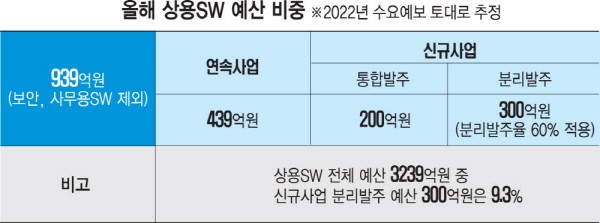
It is calculated that the budget for new commercial software(SW) separate orders were only about 10% of the whole comercial SW business budget. It is pointed out that urgent changes need to be made to raise awareness of separate orders and improve the system in order to strengthen the competitiveness of small and medium SW companies.

SW companies predicted that according to the '2022 Public Sector SW/ICT/Information Safety demand forecast' announced by the Ministry of Science and ICT, from the total budget of 323.9 billion KRW for commercial software, the separate order budget for new projects would be only 30 billion KRW (9.3%).
Excluding office software (161.4 billion KRW, 49.8%) and security software (68.6 billion KRW, 21.2%) out of 323.9 billion KRW, the rest of commercial software (operating system, system management, storage, etc.) is about 93.9 billion KRW.
Out of 93.9 billion KRW, excluding maintenance and continuous projects, the total budget for new projects is about 50 billion KRW, and if 60% separate order rate is applied, the budget of new separate orders is about 30 billion KRW.
One of the CEO of SW company said, “in order to raise profitability of small and medium SW companies, they have to secure the new projects, and if we assume there are about 10,000 commercial SW companies with conservative projections, 30 billion KRW for a new separate order budget can be very insignificant.”
The reason SW companies emphasize the need for separate ordering is that it is difficult for commercial SW companies to secure profitability in a business that is conducted through integrated ordering.
In the contract method by negotiation, the project cost is reduced due to the 80% low limit value of bidding price, and the unit price of commercial software is inevitably lowered to secure a margin for the main operator.
It is very common when placing an integrated order, the main operator to offer a win-back proposal for the software that has been introduced and used or to replace it at the lowest price.
It is pointed out that in case of integrated orders from major departments, they place integrated orders for high price portion projects with big server based middleware, and separate orders were placed for low price portion in order to assort for client developing tools.
Article 54 of the SW Promotion Act states when there is a SW project, commercial SW has to be purchased directly(separate order). However, if there are cases of ‘significant cost increase’, ‘significant delay’, ‘significantly inefficient’ or other proper reasons, Public Procurement Service or the Task Review Committee can review(deliberate) it and allow them to proceed with integrated ordering.
The revision of the SW Promotion Act at the end of 2020 is not allowing the spread of the separate orders, since they eased the exemption regulation of separate orders.
After the revision of the SW Promotion Act, ‘Management Supervision Guideline of Software Project Contract’ under Article 8, Section3, ‘Review by form when exempted product list rate is under 50 out of 100’ was added. If 10 of commercial SW are adopted, and if exempted items from direct orders are around 4 or 3 or less, they can just submit the form and proceed with integrated order without review.
The Ministry of Science and ICT said that the purpose is to have local governments with their own procurement system has to review lists that are 50% or less even by a form.
However, SW companies are claiming that before the revision of SW Promotion Act, separate order rate was about 75.1%(According to the Public Procurement Service) and now it is about 59.7%, which is 15% Point(P) lower.
Poong-yeon Cho, president of the Korea SW/ICT Federation, said, "We found out about the contents of the guideline in July of 2020, and requested for continuous deletion, but there has been no improvement."
The Public Procurement Service and the Ministry of Science and ICT are planning to have a discussion about the revision of the system to promote the separate orders, but it is known that discussion of hands-on workers has been delayed.
By Staff Reporter Ho-cheon An <hcan@etnews.com>